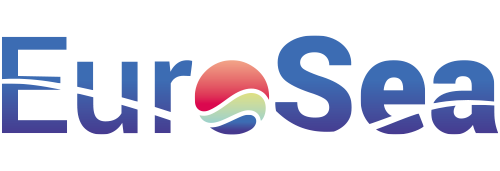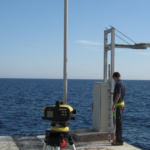In the morning of 28 March 2023, a journey began that would bridge continents, cultures, and disciplines, all in the name of advancing sustainable ocean observing. United by their passion for marine science and driven by the desire to shape a sustainable future, 11 motivated students from nine different West African countries and part of the WASCAL Masters Program embarked on the renowned research vessel Polarstern. They were accompanied by Fiona-Elaine Strasser, a member of the EuroSea communication team, who set out on this voyage with a specific goal in mind: to engage the next generation of stakeholders with the crucial topic of ocean observing, monitoring and forecasting.
Setting sail from Mindelo, Cape Verde, aboard the RV Polarstern, the second WASCAL Floating University embarked on a two-week research voyage to Bremerhaven, Germany. This transit route was an incredible opportunity for the students to dive into real-life research onboard. At first, adjusting to life on such a large ship was a bit of a challenge for most of them, simply because it was an entirely new and unfamiliar experience. But once everyone found their sea legs, they wholeheartedly embraced the work that awaited them. Throughout the journey, the students were fully immersed in the world of ocean observing while rotating through different thematic modules in smaller groups. They actively participated in the deployment of five ARGO floats, gaining hands-on experience in contributing to the collection of continuous ocean data. Along the transit route, they conducted daily stations where they skillfully operated the CTD to profile the ocean and collect water samples from different depths. They analyzed the samples for pathogens, determined oxygen levels, and by using multi-nets, observed the dial migration patterns of zooplankton.
During the science communication module, led by Fiona-Elaine Strasser and Dr. Avan Antia from the Kiel University, the students took the role of active observers following the data collection modules that were running simultaneously. Each group was responsible for planning a storyboard, recording scenes and interviews and finally to set together a short movie of each scientific station explaining its objective and process. The main goal of this task was to help the students understand the overall significance of their work on board and how it is part of the ocean observation value chain. In the process, they learned effective scientific communication techniques using professional camera equipment.
After a long day of work, everyone would gather in the red lounge for engaging conversations about EuroSea and how sustainable ocean observing is critical to understanding and monitoring the health of our beautiful ocean. The students understood how their work on board forms the basis in the overall process of ocean observing, which includes gathering data, analyzing it, and drawing meaningful conclusions. Christelle from the Republic of Benin commented:
“It is very exciting to see how the data we are collecting is contributing to global ocean observing systems and helping us understand climate change better!”
Their active involvement in ocean observing activities on board the RV Polarstern demonstrated their deep understanding of the subject and their commitment to advancing our knowledge of the marine environment. During this memorable two-week voyage, the 11 students were introduced to scientific equipment, the ship’s operations, and the importance of sustainable ocean observing, monitoring, and forecasting. From this amazing experience the WASCAL students emerged as ambassadors of knowledge, passion, and innovation, empowered to shape a bright future.




